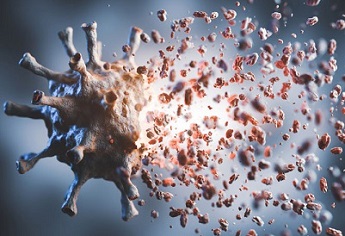COVID-19 Research: Modulation of Type I Interferon Responses Reveals Potential Breakthrough in Inhibiting SARS-CoV-2 Replication and Inflammation
Thailand Medical News Team Aug 18, 2023 1 year, 8 months, 14 hours, 50 minutes ago
COVID-19 Research: In the relentless battle against the global COVID-19 pandemic, scientists and researchers have been ceaselessly exploring innovative strategies to combat the SARS-CoV-2 virus. Recent groundbreaking research conducted jointly by Emory University in Atlanta, USA, and Ulm University Medical Center in Germany has shed light on the critical role of type I interferon (IFN-I) responses in SARS-CoV-2 infection and its potential to revolutionize treatment approaches.

This pioneering study, led by Dr Mirko Paiardini, Ph.D., from Emory University, delves into the intricate relationship between IFN-I signaling, viral replication, and inflammation, opening up new avenues for therapeutic interventions and offering a glimpse of hope in the ongoing fight against the pandemic.
Unveiling the Role of IFN-I Responses in SARS-CoV-2 Infection
Type I interferons, which serve as the body's initial line of defense against viral infections, have long been recognized for their pivotal role in orchestrating antiviral responses. However, the intricate interplay between IFN-I signaling, viral replication, and inflammation in the context of SARS-CoV-2 infection has remained largely unexplored until now. Dr Paiardini's
COVID-19 Research team embarked on a groundbreaking study to unravel these complexities and offer fresh insights into potential therapeutic targets.
Utilizing the Rhesus Macaque Model
Central to this study was the utilization of rhesus macaques, a nonhuman primate species that has emerged as a crucial model for investigating COVID-19. This species, known for its similarities to human immune responses, offers a unique platform to dissect the mechanisms of SARS-CoV-2 infection and disease progression. Dr Paiardini's team administered a mutated version of interferon, aptly named IFNmod, to modulate IFN-I signaling in rhesus macaques before and during acute SARS-CoV-2 infection. This ingenious approach enabled the researchers to uncover the intricate effects of IFN-I modulation on viral replication and inflammation.
Unraveling the Dual Nature of IFN-I Responses
The findings of the study unveiled a dual nature of IFN-I responses in the context of SARS-CoV-2 infection. While early antiviral IFN-I responses were demonstrated to play a crucial role in restraining viral replication, the researchers uncovered a previously unrecognized consequence of excessive IFN-I signaling - hyperinflammation. This revelation offers a compelling explanation for the severe manifestations observed in COVID-19 patients and underscores the importance of curbing uncontrolled inflammation in combating the disease.
IFNmod: A Potential Game-Changer
Central to this study's breakthrough was the utilization of IFNmod, a modified form of IFNα2 that exhibits weak IFN-I signaling while curbing endogenous IFN-I actions. The administration of IFNmod before and during SARS-CoV-2 infection led to a remarkable cascade of effects. Notably, IFNmod treatment was associated with a reduction in both antiviral and inflammatory gene expression, leading to lower levels of inflammatory
cytokines - key contributors to the cytokine storm observed in severe COVID-19 cases. Importantly, IFNmod treatment demonstrated an unprecedented 3,000-fold reduction in viral loads in the lower airways of treated animals, offering a tantalizing glimpse into a potential therapeutic breakthrough.
Remembering a Scientific Pioneer
As the research findings were unveiled, the scientific community was touched by the poignant tribute to co-first author Timothy Hoang, Ph.D. His unwavering commitment to scientific discovery and his impactful contributions to the study served as a testament to the enduring legacy of those who dedicate their lives to advancing knowledge and combating global health challenges.
Implications and Future Directions
The implications of this groundbreaking study are profound, heralding a new era in our understanding of SARS-CoV-2 infection and offering promising avenues for therapeutic interventions. By shedding light on the delicate balance between IFN-I signaling, viral replication, and inflammation, this research paves the way for the development of targeted treatment strategies that could mitigate disease severity and improve patient outcomes.
Furthermore, the study underscores the vital importance of translational research and collaboration on a global scale. The partnership between Emory University and Ulm University Medical Center exemplifies the power of international cooperation in tackling complex health crises.
Conclusion
In the annals of scientific discovery, few breakthroughs hold the potential to transform the trajectory of a global pandemic. The collaborative efforts of researchers from Emory University and Ulm University Medical Center have unveiled a hitherto uncharted territory in the battle against COVID-19. By unraveling the intricate dance between IFN-I responses, viral replication, and inflammation, this study opens doors to innovative therapeutic strategies and renews our collective resolve to overcome the challenges posed by SARS-CoV-2.
The study findings were published in the peer reviewed journal: Science Immunology.
https://www.science.org/doi/10.1126/sciimmunol.adg0033
For the latest on
COVID-19 Research, keep on logging to Thailand Medical News.
